New Zealand: Is the All Blacks' era of rugby dominance coming to an end?
- Published
- comments

Steve Hansen delivered the Webb Ellis Cup to World Rugby as the pools are drawn in 2017
2019 Rugby World Cup |
|---|
Hosts: Japan Dates: 20 September to 2 November |
Coverage: Full commentary on every game across BBC Radio 5 Live and Radio 5 Live Sports Extra, plus text updates on the BBC Sport website and app. |
Sportswriters occasionally claim the headline, written by someone else on the paper, has mis-sold their words.
New Zealand rugby journalist Chris Rattue could have no such complaint.
"Just give us the World Cup now" ran a front-page plug for his piece in the New Zealand Herald., external
Turn inside to the sport section and his opening line told readers "it's time to jump the gun".
He added: "They might as well hand over the Webb Ellis Cup now, with the All Blacks looking this good."
And on that day - Sunday, 26 August 2018 - no-one could have had many complaints about it either.
Mercurial fly-half Beauden Barrett had just scored four tries in a thumping 40-12 win over Australia.
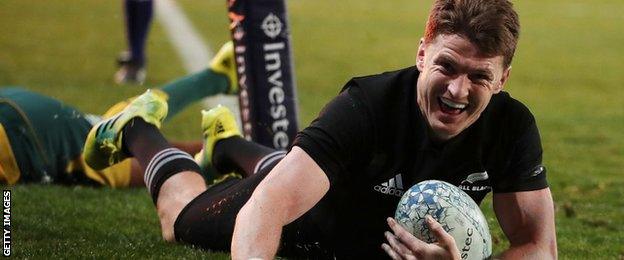
Beauden Barrett slides in for one of his four tries in August 2018's win over Australia
The victory meant that, since winning their second successive Rugby World Cup in the autumn of 2015, New Zealand had lost just three of the following 33 Tests.
The total domination of world rugby showed no sign of ending and there was no reason to think it would not extend to Japan 2019 and a third straight world crown.
But, with their opening pool match and a potential final dress rehearsal against second-favourites South Africa looming, things are not quite so certain.
The end of an era?
In August this year another article appeared, this time on the other side of the Tasman Sea after a very different Bledisloe Cup result.
Sydney-based newspaper The Australian fed images, external of All Blacks Sonny Bill Williams, Sam Whitelock and Kieran Read into the viral Faceapp tool, putting another 40 years on the 30-plus All Black mainstays.
The dig at the 'Old Blacks' sprung from the Wallabies' record 47-26 win over a 14-man New Zealand in Perth a few days earlier.
The game before that, New Zealand had been held to a 16-16 draw on home turf by a resurgent South Africa. Nine months previously, they had been squeezed out by a relentless Ireland side in Dublin, going down 16-9.
As a result of those defeats, for what they are worth, World Rugby's own rankings, external rate Ireland as the world's best team heading into the tournament, as first Wales and now Joe Schmidt's side ended the All Blacks' near-decade long hold on top spot.
So is this the end of an era? Or just a false dawn for their chasing rivals?
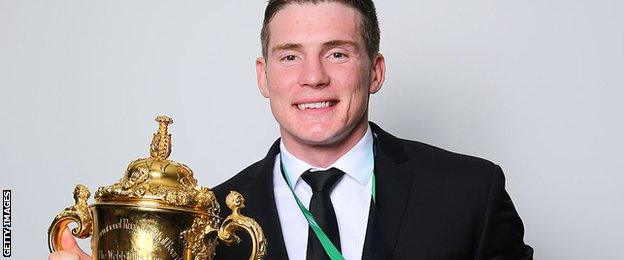
Colin Slade is one of a select band of two-time Rugby World Cup winners
Ominously Colin Slade, a member of those successful squads in 2011 and 2015 who now plays his club rugby with French side Pau, believes the recent taste of adversity could sharpen the All Blacks' appetite for more World Cup glory.
"I think that defeat in Perth, especially, might be a good thing as a bit of a wake-up call, a reminder that everyone is beatable on their day," he told BBC Sport.
"I think a lot of people tend to push the panic button really early and read a lot into things, especially with the All Blacks.
"One bad performance and everyone is led to believe the wheels are off the wagon.
New Zealand's possible route to the final (based on results going with current world rankings) | |
|---|---|
Pool | South Africa |
Pool | Canada |
Pool | Namibia |
Pool | Italy |
QF | Scotland |
SF | England |
Final | Ireland |
"Heading into 2015, we weren't beating everyone comfortably but we had experience and belief on the mental side of the game.
"That is something head coach Steve Hansen has preached since before 2011 and has installed in every new player who comes into the squad - when times get tough, you have to switch up mentally, remain calm and focus on performing your job for the team."
The missing men
There are several things they are missing when compared to four years ago however; Dan Carter, Ma'a Nonu and Richie McCaw for a start.
The decorated trio all bowed out of international rugby with the final win over Australia at Twickenham.
The vacuum has been filled with discussion.
While the 2015 side almost named itself, head coach Hansen's choices in Japan are more tricky.
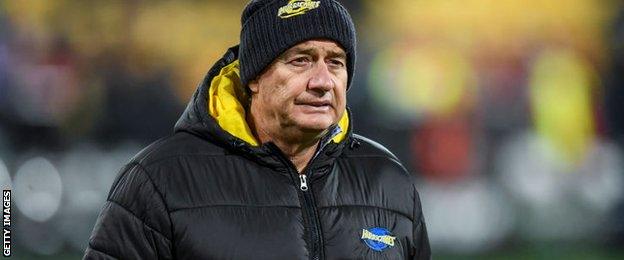
Chris Boyd guided the Hurricanes to a 31-31 draw with the British and Irish Lions in 2017
"I don't think they are as stable as they were in 2011 or 2015," Northampton director of rugby, former Hurricanes coach and New Zealander Chris Boyd told BBC Sport.
"Those two teams were in concrete two years out.
"They understood the game they were playing, the players who were playing 1-15 knew who they were, the players 16-23 knew who they were and the guys outside the 23 knew who they were and they all had their roles.
"I think in the current side they are still 'fishing' because of injury, loss of form, unavailability and some guys putting their hands up."
Barrett is perhaps the first name on the team-sheet. But, with Hansen keen to deploy two playmakers in his XV, the question is where he fits in.
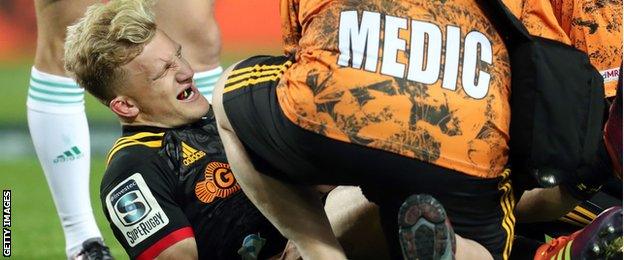
Damian McKenzie has had surgery on ligament damage sustained in April, ruling him out of the tournament
In the autumn, livewire Damian McKenzie shared the responsibility from full-back.
But his serious knee injury, external has forced a rethink and a re-jig, with Crusaders' Richie Mo'unga brought in at fly-half and Barrett switching to full-back.
"I like and understand the logic of having two playmakers on the field, that can help a lot," said Slade.
"'Beaudie' is a class act, needs to be on the field, and will be.
"Damian McKenzie is potentially a big loss, but the way Richie is going, he may have forced his way in there somehow.
"What Steve is going to do now is balance the make-up of the rest of the team and he will have some games in the pool to figure out his best combination."
The ghosts of World Cups past
As Hansen tinkers with the chemistry in his line-up in the early stages, New Zealand hope to be handing out lessons on recent history by the end of the tournament.
While they have dominated the last two editions of the Rugby World Cup, their relationship with the game's showpiece is complicated bordering on tortuous.
New Zealand at the Rugby World Cup | |
|---|---|
1987 | Winners |
1991 | Third place |
1995 | Runners-up |
1999 | Fourth place |
2003 | Third place |
2007 | Quarter-finals |
2011 | Winners |
2015 | Winners |
After winning the inaugural 1987 event, it took another 24 years until they finally got their hands on the William Webb Ellis trophy for a second time.
Until that cathartic 2011 triumph, the All Blacks turning from serial winners to late-stage chokers had become something of a World Cup tradition.
Have the ghosts of the semi-final defeat by France in 1999 or in the last eight to the same opponent in 2007 finally been exorcised? Or, might they be exhumed again if things get tight in the knockout stages?
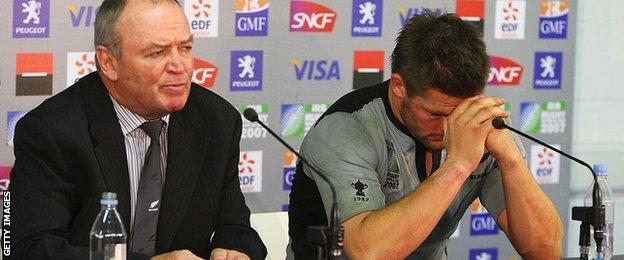
Coach Graham Henry and captain Richie McCaw face the music after being eliminated by France in the 2007 quarter-finals, the last time the All Blacks lost a Rugby World Cup match
"In 2011 the pressure was almost claustrophobic," remembers Patrick McKendry, senior writer at the NZ Herald.
"The final that year was painful for most New Zealanders to watch. They just had to get it done and they got it done and a very large monkey off their backs.
"The mood of the nation took a bit of hit after being beaten by Australia in Perth, however the response, beating the Wallabies 36-0 a week later, was pretty impressive.
"I would say the collective mood in New Zealand is quiet confidence. Three in a row will be hard, but they are pretty confident they can do it."
South Africa on Saturday will be a stern test of that confidence, the champions' credentials and and whether the All Blacks' era of dominance is ending.